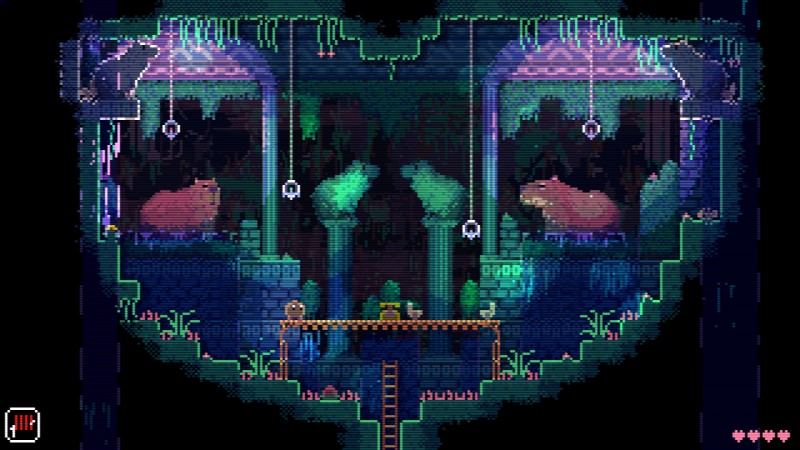Animal Well pleased, surprised, or scared me with something new at every turn as it confidently jumped from one idea to the next up until its conclusion. That novelty lost its luster near the end of its 8-to-10-hour runtime as I treaded the fresh sheen off familiar ground, but it never lost its lively, naturalistically wild heart – even when occasional difficulty spikes compounded that staleness. Still, its tense atmosphere is inherently compelling. Illuminated by dangling lanterns and brought to life with lovingly animated animals and Rube Goldberg-like puzzles but dimmed by an ominous synth tone reminiscent of Twin Peaks’ haunting score, Animal Well establishes itself with a rare, masterful sense of place without missing a beat.
In Animal Well, you play as a little blob who must get home. Similar to other Metroidvania games like Super Metroid or Hollow Knight, your path is anything but linear; you must collect items and powerups that unlock new abilities, which will – sometimes literally – open up new doors.
Starting as a powerless, adorable little blob became a distant memory as I added to my menagerie of movement-enhancing and puzzle-solving tools. These playful tools like a frisbee, bubble wand, yo-yo, or Slinky highlight Animal Well’s madcap nature. Each tool has clever alternate uses that encouraged me to brush up against what I previously thought its barriers were in stimulating ways. Instead of awkwardly rubbing up against the seams of this Swiss Watch of a world, it felt like I was pulling a fast one on the creator Billy Basso – even though he was probably in on my scheme.
I first realized the multifaceted power these tools hold when I was fighting off one of Animal Well’s ghosts after setting off some firecrackers to scare one out of a dark room. Normally, you can’t check your map in the dark. But setting off these firecrackers suddenly lit up the room enough for me to check my map. These kinds of immersive touches add layers of flavor and liveliness to its world.
Stretching and going beyond what you thought was possible in Animal Well reveals a wealth of secrets and surprises, like the collectible Secret Eggs. Expanding your ovate arsenal opens up fast travel options and even more game-expanding trinkets. Basso’s love for museums and architecture shines through in Animal Well’s richly realized world. Furnished by bespoke landmarks like tile art murals of rabbits, statuettes of capybaras, and rats running in hamster wheels that power The Well’s mystic mechanisms, these flourishes (sometimes literally) electrify each room.
It subtly balances the right amount of cheek into its surreal vibe, too. At one point, I found myself looking for the next corridor to spelunk. Assuming I’d at least find an egg, I hopped down a large pit. Hitting the ground with an unceremonious “thunk,” I landed near three penguin-shaped shrubs I’d walked past minutes before. Landing at the decoration again after a fall, with the only way back up being a grueling climb, gave it meaning and life. I could feel its developers poking fun at my flightless avatar.
Animal Well hides its fangs in its main character’s powerlessness: there’s no fighting back against the bigger predators that chase you down. Usually, those moments highlight a clever approach to progression. But they sometimes dredge up its greatest flaw. Like many classics of the genre, the only checkpoints here are its save points. With only a handful scattered throughout the map, I spent much time revisiting rooms I’ve already explored top-to-bottom. This would be damning for a game with a worse sense of style, but the act of smelling Animal Well’s roses is so sweet that it’s nothing more than an inconvenience.
Teeming with life, secrets, and charm that surprise and delight, Animal Well held my full, undivided attention. Even in its most trying moments, it left a mark of endearment on me thanks to its absorbing soundscape, distinct yet familiar pixel-based art style, and flexible, mold-breaking approach to exploration.
